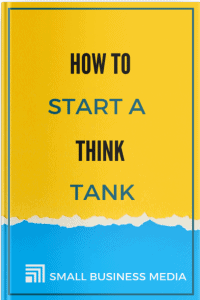What is a think-thank, and how do you start one?
These may be the questions running through your mind.
Whether you’re new to the concept “think-thank” or you’re familiar with it but don’t know how it works, you’ll find out all you need to know and how to start one.
What is a Think Tank? – How to Start a Think Tank
A Think tank is a group or team of individuals, specifically, experts who come together for the sole purpose of brainstorming ideas on how to solve specific problems.
The activities of a think tank could involve; reading, writing, researching, and discussing topics with relevance to strategic planning or public policy.
It is a sort of combined intelligence.
They are usually funded by corporate bodies, government, or special interest groups.
Think tanks are of various types.
Above all, every think tank is set up to find solutions to a specific issue or problem.
Think tanks are also called think factories.
Origin and History of Think Tanks – How to Start a Think Tank
The words think tank was first used in the military.
It was used to refer to areas safe from enemy prying eyes.
This term was also used to carry out strategizing and planning during the Second World War.
Its meaning was later changed when it was used in the USA to refer to private nonprofit organizations that carried out policy research in the 1960s.
The Fabian society developed in the 19th century in Britain is the oldest political think tank that ever existed.
Over the years, there has been a commendable growth of think tanks in the USA.
USA’s tendency to fund privately rather than publicly has also contributed to the swift growth of think tanks in the country.
Other countries like the UK, Australia, and Canada have also seen the growth of these organizations.
However, there are fewer think tanks in these countries, and they are not as well funded as the ones in the USA.
North America and Europe were discovered to have more think tanks than any other part of the world during the 21st century.
Furthermore, think tanks varied in Europe.
In France, think tanks organizations were associated with the government and some political parties.
Think tanks in Germany were very significant but were often funded by the state and associated with universities or political parties.
While in Spain, Greece, and Italy, think tank organizations started springing out during the 1970s.
Finally, research conducted in other parts of the world has indicated that think tanks might exist globally in many organizations.
Categories of Think Tanks – How to Start a Think Tank
To know how to start a think tank, it helps to know the different types of think tanks in existence.
Hence, the following are the seven think tank categories:
Independent and Autonomous
The think tanks that fall under this category function independently from the influence of financiers or groups that support them in one way or the other.
Since they are independent and autonomous, they do not get funds or support from the government.
Quasi-Independent – How to Start a Think Tank
This category of think tanks is said to be independent of the government but are managed by a particular financier, agency, or interest group.
The financier is responsible for controlling the funds of the organization.
Government Affiliated Think Tanks
These think tanks have a formal affiliation with the government.
Quasi-Governmental –How to Start a Think Tank
These are not among any of the government’s formal structures but are fully funded by grants from the government.
University-Affiliated Think Tanks
These are think tanks that are associated with a particular university.
Political Party/Ideology Affiliated – How to Start a Think Tank
Any think tank that is associated with a particular political ideology or party falls under this category.
Corporate (Profit-Driven)
These think tanks work for a particular corporation and are always profit-driven.
Regardless of the category, a think tank falls under, its primary purpose remains to seek solutions to issues and problems.
Steps on How to Start a Think Tank
Starting an independent think tank takes determination and hard work.
It might even seem difficult at first.
However, you will find it easier to start up with the following steps we will be sharing with you.
Study and Understand the Think Tanks in Your Locality
The first thing to do when starting a think tank is to study and understand the working of think tanks in your locality.
Identify their function and have a clear idea of how those think tanks affect foreign policies.
You also need to set up a comprehensible profile and a distinctive concept for your think tank.
Discover the suitable niche for your think tank and how it can be worked into the scene.
Try as best as you can to avoid copying a concept already in your locality and direct competition.
Create Your Main Team – How to Start a Think Tank
Your focus should mainly be on creating your main team during startup.
The number of individuals in an optimal team varies from 5-10 people.
These people ought to have professional and educational backgrounds, political affiliations, and skills.
They are also meant to have special skills that can boost the think tank development and chances of success.
These requirements are set because a think tank needs a wide range of expertise to become a legal and successful organization.
Use your network and methodically invite individuals you know already with different expert knowledge and background who will volunteer to become a member of your main team.
This will make forming your main team easier at startup.
Build Your Main Team
Your main team is the people you will spend more time with at startup.
Therefore, you need to make the work environment comfortable, supportive, and fun.
Work together with your team; let them get to know you.
Setting unrealistic goals and having work overload can make the work environment hostile and lead to burnout symptoms, exhaustion, and failure.
You should always consider the fact that your team members are primarily volunteers and that your think tank is at its beginning stage.
To make your main team more effective and efficient, you should work on building your team.
Think of activities you could do to help build your team.
Organize Series of Events – How to Start a Think Tank
After forming and building up your core team, the next step is organizing public events.
These events have to be for the following specific purposes.
Developing Strong Relationships with Supporters and Partners – How to Start a Think Tank
A think tank at its startup period should develop and build up strong and healthy relationships with other think tank organizations in the environment.
The way to go about this is by organizing events where established think tanks, growing think tanks, organizations related to think tanks, and potential supporters are invited.
However, when you do this, avoid inviting think tanks with the same ideologies as yours.
It is best not to be too closely associated with organizations with similar ideologies as yours, especially at your startup stage.
When you do this, you will stand on your own and form your unique profile.
This sort of event will help pave the way for:
Future Partnership – How to Start a Think Tank
It creates a healthy relationship between you and your competitors.
This way, they do not see you as the enemy.
Instead, they see you as an addition to the think tank family.
This will help you secure a partnership with them which will help you gain access to a more extensive range of audiences.
Opportunity to Pitch Your Ideas – How to Start a Think Tank
It creates an avenue for you to meet with some local foundational organizations and pitch your ideas and vision to them.
When they see your innovative work and engagement, they might likely want to invest in your organization.
This investment will be profitable to your organization.
Organize Events to Reach People within Your Network–How to Start a Think Tank
These outreach events within your circle will help you discover people who will be willing to support and commit to your idea of building your think tank team.
They are mostly held before forming your main team because it serves to get members for your team.
You should invite individuals you know already have expert knowledge or skills to help build your resourceful main team for these events.
The first meeting can start with just three persons who then introduce the idea to their network.
This way, you can grow into a team of ten or more individuals.
Organize Events for Recruitment of Dedicated Members– How to Start a Think Tank
Dedicated members, also called active members, are like-minded individuals who are ready to help build up the foundation and community of your organization.
Just like your main team, this group of persons has to be of diverse backgrounds and expertise.
Ensure that there’s enough diversity between these individuals regarding age, origin, gender, political orientation, interests, and expert knowledge.
At your grass-root level, you are reliant on this group of people.
To get these volunteers who will be dedicated to the organization, you will have to organize some public outreach events.
One way of getting people to come is by sending out a general invitation out to the public.
You could air your invite or get it published in the newspapers or magazines.
In all, ensure that the invites are captivating.
You could invite a guest who is an expert in one profession or the other to the event.
Then have the participants have an informal discussion with your guest in a relaxed atmosphere.
You will find it easier to encourage people to participate when you have a guest present.
Your core members could also encourage the participants to come for more meetings and eventually join the organization.
Organize Private Events to Discuss Key Topics – How to Start a Think Tank
These types of events are aimed at deciding the topic you want your think tank to focus on.
The topics decided on gives your think tank its purpose and research focus areas.
It also helps your think tank to be dedicated to a specific thematic framework.
When organizing these events, ensure that you use your network and invite interested experts in a significant field.
Figure out Your Working Method
Your working method is also called your approach.
Some organizations sometimes despise the idea of starting small.
So, they seek significant funds to start big research projects hoping that it will help them earn credibility and top marks.
This approach, most time, does not help an organization because the funding sources can quickly dry up when investors cannot wait for months before seeing positive results.
The best approach is to get people’s attention and not go all out with massive projects when starting a think tank.
You should seek a working method that your target audience can easily identify with.
Here are some approaches you could take to draw people’s attention:
Defining Your Product/Output Packages –How to Start a Think Tank
As a startup think tank, defining your product packages is one of the first things to do.
By defining your product package, you can present your output properly on every policy issue you choose to research.
For example, you can repeatedly use a similar approach for every topic you have chosen to address.
The repetition will allow you to know more about the topics and become proficient at them.
Your products can be packaged and delivered well by:
- A literature assessment, then post on your blog for every study reviewed or critical paper
- Then a published background document, and also make a post on your blog
- Follow it up by making three policy briefs, and also make three posts on your blog
- The last action is to launch the policy briefs in a series of events, accompanied by blogs, media coverage, and videos.
Initiatives – How to Start a Think Tank
This approach is quite an exciting one.
However, it demands competence and skilled management.
Creating Annual Reports– How to Start a Think Tank
One thing that pricks the interest of several important persons is a big standard report.
You can launch your think tank by creating huge systematic reviews about essential policy questions.
You can also produce standard annual reports about the states or challenges of different sectors.
When creating these reports, you should ensure to accompany them with other outputs.
There are other approaches to consider but always go for the one that will work best for your organization.
Find the Most Suitable Arrangement for Governance– How to Start a Think Tank
Several administrations are accessible to a think tank organization.
However, finding a suitable one can sometimes be difficult.
You can consider subscribing to the following:
- A governing body standing independent of a think tank management and also responsible for the organization’s long-term goals.
- An executive body with a skilled manager as the head.
- A group of senior researchers (core team) responsible for communications, management, and research.
- Your active members.
Work Digitally– How to Start a Think Tank
When starting a think tank, you do not necessarily need office space.
You can go digital.
Hence, the money you would have used to rent an office you can use instead of funding digital tools.
Your research team can meet together at a coffee shop or any open space and work with their public Wi-Fi and their laptops.
Get the tools needed in dealing with finances, sharing and storing documents, and taxes.
You can also communicate with your team and the audience digitally.
Do not wait to Have Big Funds before Getting Started
You do not need to get big funds before starting your think tank.
Instead, you can take make use of a standard visibility approach and a flexible structure of governance and start well with the following outputs:
Publish While Reading – How to Start a Think Tank
Whenever you or your team read a book, paper, or article, you can post a brief review about it on your think tank’s website or blog.
You can tag each post to your think tank main policy topics.
As you continue with this, your site will have an incredible archive on these different topics.
With this, it will be possible to start a post that summarizes your previous posts.
You can include opinion posts.
All these outputs seem more like a think tank output.
Publish Ideas of People Your Think Tank Agrees with – How to Start a Think Tank
Do not wait till your think tank has a great idea or something important to say before publishing content.
You can use other people’s ideas to produce content as long as your think tank ideologies and values agree to it.
It is no crime to say you got your idea or solution to an issue from someone else.
Do not miss the opportunity of being able to publish great content because the idea is not yours.
Reuse Old Research – How to Start a Think Tank
Some startup think tanks often feel like they have nothing or very little to publish on their websites because they just started.
However, you should know that the members of your think tank have had previous ideas and works published.
You can make use of their previous works to help your organization’s output.
When republishing it, ensure you don’t credit yourself or your think tank for it.
Instead, credit the owner of the research.
If the research was written and conducted by a researcher or director under a different think tank, ensure you don’t delete the organization’s logo.
It is not a crime to do this; you are only making the old research known again.
Create New Contents by Producing Events – How to Start a Think Tank
Producing events is an effective method of making great content and attracting people to your think tank organization.
Create a Strategy – How to Start a Think Tank
Strategies are very important in every organization.
However, try not to make your strategy plan complex with too many objectives.
Instead, set a clear mission and vision, define your plan of action and work with it.
Conclusion on How to Start a Think Tank
Think tanks are all about reading, learning, and researching.
Whatever the point you get in your think tank organization, do not stop learning.
You could also seek out other thinktankers and learn from them.
Click on Buy Now For A PDF Version of This Blog Post
 |










